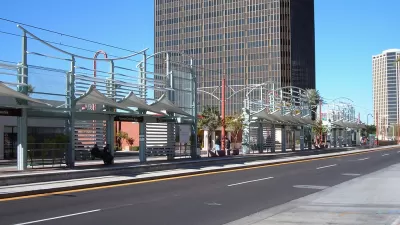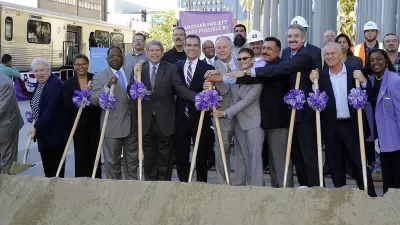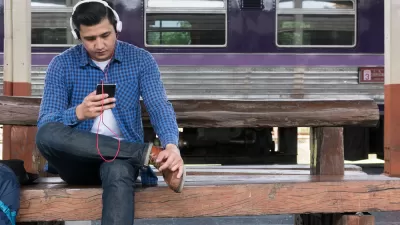The chair of the House Committee on Transportation and Infrastructure used the word "unlawful," when describing the tardy delivery of allocated capital investment funding by the Federal Transit Administration under the Trump administration.

Angie Schmitt sums up the dysfunction in Washington, D.C. on the matter of transit funding, as exposed in a Congressional hearing this week:
The Trump Administration has been starving shovel-ready transit projects of money that Congress had specifically made available — an 'unlawful' form of foot-dragging that has cost local transit providers more than $850 million, according to the latest Congressional report that again confirms what transit agencies and advocates have long known.
Wait time for transit funding has doubled under the Trump administration, according to a report that uses data from the federal Transit Administration. "All that waiting is expensive. Congressional analysts estimate the Trump Administration slowdown has led to $845 million in extra costs for transit agencies," according to Schmitt.
Transportation for America first raised alarms about the tardiness of transit funding allocated by Congress and then held up by the Trump administration, and the problem has persisted throughout the administration's tenure.
"In a Congressional hearing on Tuesday, House Transportation and Infrastructure Committee Chairman Peter DeFazio (D-Oregon) called the Trump Administration’s actions 'unlawful,'" according to Schmitt.
Patrick Sisson provides additional details of Tuesday's hearings and the tardy actions of the Federal Transit Administration in a separate article for Curbed.
The debate goes on as to whether the funding delays are the result of transit antagonism by the Trump administration, incompetence by the Trump administration, a broken and inefficient system—or all three. The fact remains that transit funding was delivered in half the time under the previous administration.
FULL STORY: President Trump Has Starved Transit Agencies of $854M

Study: Maui’s Plan to Convert Vacation Rentals to Long-Term Housing Could Cause Nearly $1 Billion Economic Loss
The plan would reduce visitor accommodation by 25,% resulting in 1,900 jobs lost.

North Texas Transit Leaders Tout Benefits of TOD for Growing Region
At a summit focused on transit-oriented development, policymakers discussed how North Texas’ expanded light rail system can serve as a tool for economic growth.

Why Should We Subsidize Public Transportation?
Many public transit agencies face financial stress due to rising costs, declining fare revenue, and declining subsidies. Transit advocates must provide a strong business case for increasing public transit funding.

How Community Science Connects People, Parks, and Biodiversity
Community science engages people of all backgrounds in documenting local biodiversity, strengthening connections to nature, and contributing to global efforts like the City Nature Challenge to build a more inclusive and resilient future.

Alabama: Trump Terminates Settlements for Black Communities Harmed By Raw Sewage
Trump deemed the landmark civil rights agreement “illegal DEI and environmental justice policy.”

Dear Tesla Driver: “It’s not You, It’s Him.”
Amidst a booming bumper sticker industry, one writer offers solace to those asking, “Does this car make me look fascist?”
Urban Design for Planners 1: Software Tools
This six-course series explores essential urban design concepts using open source software and equips planners with the tools they need to participate fully in the urban design process.
Planning for Universal Design
Learn the tools for implementing Universal Design in planning regulations.
City of Santa Clarita
Ascent Environmental
Institute for Housing and Urban Development Studies (IHS)
City of Grandview
Harvard GSD Executive Education
Toledo-Lucas County Plan Commissions
Salt Lake City
NYU Wagner Graduate School of Public Service





























